|
|
|
Sort Order |
|
|
|
Items / Page
|
|
|
|
|
|
|
| Srl | Item |
| 1 |
ID:
178304
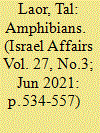

|
|
|
|
|
| Summary/Abstract |
Digital platforms have become a major tool for media figures. The Internet offers the media essential tools, most notably authentic and accessible sources of information and the absence of censorship. Digital media provides media personalities with a platform that is free and fast where they can express themselves freely without ‘gatekeepers.’ Drawing on Deuze’s five-dimensional model of journalism, this article shows that for the content transfer platform, the network is characterised by a young audience, leading to more consumer confidence due to its authentic nature. It also found that platform selection relates directly to content and that media people use the network to promote agendas. In addition, their influence on social networks is greater because they are bi-directional and allow for audience reaction. As for the media figure’s personality, it was found that the success of media figures does not involve the quality of the content but the admiration of the audience. In addition, it emerged from the interviews that technological determinism affects media figure activities such that ‘the medium is the message’ – type of media dictates choice of the content transfer platform, content, and media figure personality.
|
|
|
|
|
|
|
|
|
|
|
|
|
|
|
|
| 2 |
ID:
153772
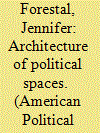

|
|
|
|
|
| Summary/Abstract |
The problem of trolls exemplifies the challenges of building democratic communities in the digital environment of social media. Distinguishing trolls from activists can be difficult; democratic theorists have yet to adequately address how to prevent the former while remaining open to the latter. In this article, I outline a theory of democratic politics that takes space as a central element in shaping democratic interactions. Using the work of John Dewey, I draw out two key characteristics of democratic space: boundedness and flexibility. Using these criteria, I then evaluate Kinja, Gawker Media's commenting platform, both before and after trolls attacked the site in 2014. I find that in altering its boundaries to successfully protect against trolls, Kinja introduced a new problem: a lack of flexibility that continues to affect the possibility for democratic discourse on the platform. I conclude by suggesting how this theory of democratic space might shape future research.
|
|
|
|
|
|
|
|
|
|
|
|
|
|
|
|
| 3 |
ID:
153219
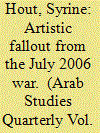

|
|
|
|
|
| Summary/Abstract |
A decade after the end of Israel's 2006 war on Lebanon, I spotlight the hitherto under-researched literary portrayals of the conflict. Following an overview of the immediate and (then-) innovative media tools and techniques used to capture its momentum—blogging, video-making, and online comics—and of Arabic-, French-, and English-language literary writings referring to the war, I focus on how literature, which requires time for its “contents” to be distilled into a form removed from emotional immediacy, succeed not only in reflecting it but also in reflecting on it through various fictional(izing) prisms. I do so by comparing the methodologies adopted by Nada Awar Jarrar's A Good Land and Abbas El-Zein's Leave to Remain: A Memoir, both published in 2009, and by arguing that they share a sense of guilt and hence exhibit an ethical exigency by incorporating particular discourses to mediate and mediatize this war as crisis: the social/humanitarian in A Good Land and the visual/photographic in Leave to Remain.
|
|
|
|
|
|
|
|
|
|
|
|
|
|
|
|
| 4 |
ID:
160401
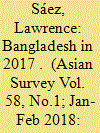

|
|
|
|
|
| Summary/Abstract |
Bangladesh experienced a turbulent year in 2017, largely as a result of damaging floods. Moreover, the flood of Rohingya refugees in the second half of the year added considerable strain to Bangladesh’s political economy. There are worrisome signs that the Bangladeshi state is using a range of institutional and extrajudicial mechanisms to stifle political opposition.
|
|
|
|
|
|
|
|
|
|
|
|
|
|
|
|
| 5 |
ID:
162093
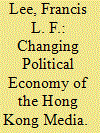

|
|
|
|
|
| Summary/Abstract |
Most observers argued that press freedom in Hong Kong has been declining continually over the past 15 years. This article examines the problem of press freedom from the perspective of the political economy of the media. According to conventional understanding, the Chinese government has exerted indirect influence over the Hong Kong media through co-opting media owners, most of whom were entrepreneurs with ample business interests in the mainland. At the same time, there were internal tensions within the political economic system. The latter opened up a space of resistance for media practitioners and thus helped the media system as a whole to maintain a degree of relative autonomy from the power centre. However, into the 2010s, the media landscape has undergone several significant changes, especially the worsening media business environment and the growth of digital media technologies. These changes have affected the cost-benefit calculations of media ownership and led to the entrance of Chinese capital into the Hong Kong media scene. The digital media arena is also facing the challenge of intrusion by the state.
|
|
|
|
|
|
|
|
|
|
|
|
|
|
|
|
| 6 |
ID:
050487
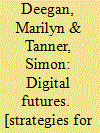

|
|
|
|
|
| Publication |
London, Library Association Publishing, 2002.
|
| Description |
xii, 276p.
|
| Series |
Digital future series
|
| Standard Number |
1856044114
|
|
|
|
|
|
|
|
|
|
|
|
Copies: C:1/I:0,R:0,Q:0
Circulation
| Accession# | Call# | Current Location | Status | Policy | Location |
| 047260 | 025.30285/DEE 047260 | Main | On Shelf | General | |
|
|
|
|
| 7 |
ID:
192867
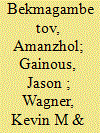

|
|
|
|
|
| Summary/Abstract |
A wealth of research examines the relationship between digital media consumption and political participation. Research typically defines participation broadly and focuses on Western contexts. We seek to add to the understanding of this relationship by focusing more directly on the relationship between digital media consumption and the propensity to vote among young people in a less democratic context. To do so, we examine a set of Central Asian countries (Kazakhstan, Kyrgyzstan, Tajikistan and Uzbekistan) that have varying degrees of democratization. We test whether digital media consumption stimulates voting among respondents aged 18–30, and if this is contingent on how free and fair are the elections. Our results suggest that in the most democratic country, Kyrgyzstan, the relationship between digital media use and the propensity to vote is relatively flat while digital media use in less democratic countries, overall, is associated with a decrease in the propensity to vote.
|
|
|
|
|
|
|
|
|
|
|
|
|
|
|
|
| 8 |
ID:
167386
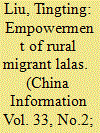

|
|
|
|
|
| Summary/Abstract |
In today’s China, women’s social roles continue to be rigidly associated with gender-based responsibilities that include defending the integrity of their family, entering into heteronormative marriage, and showing reproductive capabilities. Most of those who self-identify as lalas (lesbians) struggle with such issues as self-shaming emotions, disclosing their homosexuality to family members, friends, or colleagues, and dealing with family and social pressures. Within this context, I investigate queerness in a group of young Chinese rural migrant lalas working and living in the industrial area of the Pearl River Delta economic zone in South China. I draw two conclusions. First, rural-to-urban labour migration empowers rural female lalas by providing a measure of economic independence and an escape from patriarchal and homophobic family relations. Second, the integration of traditional (offline and face-to-face) socializing locations and emerging virtual communicative spaces plays an important role in the process through which possibilities of living a queer life are carved out.
|
|
|
|
|
|
|
|
|
|
|
|
|
|
|
|
| 9 |
ID:
096751
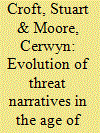

|
|
|
|
|
| Publication |
2010.
|
| Summary/Abstract |
This article examines the evolution of threat narratives in the age of terror, focusing on the United Kingdom. The analysis is broken down into two sections. The first part of the article presents four distinct and yet overlapping notions of the threats which have influenced both the West, and more specifically the UK, in debates about counterterrorism since 9/11. The four threat narratives-Al-Qaeda as a central organization; decentralized terror networks; home grown; and finally apocalyptic threats-have all been used to inform counter terror measures in the West. The second section of the article argues that terrorism has evolved strategically, and is hybridized owing to the security environment-interpenetrated by globalization, digital media and information communication technologies-in which it occurs. The article concludes with a preliminary discussion of some strategic and operational themes which have influenced the form and character of terrorism and insurgency, exploring how they impact on the ways in which threats are constituted and countered, illustrating that what is new maybe the nature of our own fears.
|
|
|
|
|
|
|
|
|
|
|
|
|
|
|
|
| 10 |
ID:
178632
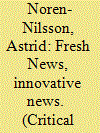

|
|
|
|
|
| Summary/Abstract |
This article seeks to advance understanding of how the new logics of an expanding digital media system can be mobilized in the service of authoritarianism, by tracing how an online news platform support the legal and discursive production of hegemonic authoritarianism in Cambodia. A state crackdown on independent media has been accompanied by the rise of private digital news outlet Fresh News, which has played a singular role in enabling, legitimizing, and seeking to craft support for Cambodia’s recent shift from competitive to hegemonic authoritarianism. Fresh News represents an authoritarian innovation which can be broken down into three main components: articulating a government-aligned definition of democracy which celebrates strongman rule and rejects liberal democracy; supporting an ongoing judicialization of Cambodian mega-politics; and disseminating a “fake news” discourse which seeks to achieve an epistemic shift. The ambiguous status of Fresh News as a private though overtly state-sanctioned enterprise is a key aspect of these authoritarian innovations, as it popularizes Cambodia’s authoritarian turn from the vantage point of an elusive distance from the state.
|
|
|
|
|
|
|
|
|
|
|
|
|
|
|
|
| 11 |
ID:
185907


|
|
|
|
|
| Summary/Abstract |
In the Manichaean discourse of the radical-right populist parties, both religion and gender play a role in the discursive process of ‘othering’. At the same time, on some occasions, populist discourse also mobilises Christianity and gender equality against immigrants, which has been interpreted through the frames of hijacking or instrumentalization. In this paper, I advance two arguments: first, I illustrate the relevance of the literature on secularisation to finetune the analysis of the entanglements of populism, religion and gender, to overcome the ‘hijacking’ frame; second, I make a plea for a socio-constructivist perspective, which pays attention to how the actors make sense of their religious-political engagement and try to avoid paternalistic interpretations. Empirical analysis focuses on the discourse of the supporters of Matteo Salvini, the leader of the Italian radical-right populist party Lega Nord, on Instagram, showing the intersections of religion and gender.
|
|
|
|
|
|
|
|
|
|
|
|
|
|
|
|
| 12 |
ID:
152491
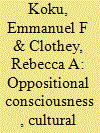

|
|
|
|
|
| Summary/Abstract |
The Internet has potential as a tool for propagation of minority cultures and identities. As China is a multi-ethnic, multilingual society, people of varying cultural backgrounds and across the Chinese diaspora may be found participating in Chinese language sites. However, little attention has been paid to the separate online activity among any of China’s 55 officially recognized ethnic minority groups, such as the Uyghurs, especially in their native languages. In this paper, we consider in what ways digital media such as interactive online community forums (UY: munbar) may be used by one ethnic group, Uyghurs, as a means of mobilizing their community to preserve their culture and support their community. As the majority ethnic group within a region of China noted as among China’s most politically sensitive, Uyghur use of computer-mediated communication provides a rich source of study.
|
|
|
|
|
|
|
|
|
|
|
|
|
|
|
|
| 13 |
ID:
119478


|
|
|
|
|
| Publication |
2013.
|
| Summary/Abstract |
Many agree that digital technologies are transforming politics. They disagree, however, about the significance and character of that transformation. Many of the pioneers of understanding the distinctive dynamics of new digital media platforms-social media and collaborative production-are quite optimistic about the potential for the Internet to dramatically increase the quality of democratic governance. On the other hand, some political scientists who have examined actual patterns of political activity and expression on digital platforms come away skeptical that digital platforms will bring equality or inclusion to democratic politics. We bring these two opposed perspectives in this article by developing six models of how digital technologies might affect democratic politics: the empowered public sphere, displacement of traditional organizations by new digitally self-organized groups, digitally direct democracy, truth-based advocacy, constituent mobilization, and crowd-sourced social monitoring. Reasoning from the character of political incentives and institutional constraints, we argue that the first three revolutionary and transformative models are less likely to occur than the second three models that describe incremental contributions of technology to politics.
|
|
|
|
|
|
|
|
|
|
|
|
|
|
|
|
| 14 |
ID:
183488
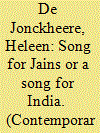

|
|
|
|
|
| Summary/Abstract |
This research note studies the interaction of religiosity and national sentiment on the popular level of Jainism in dealing with the COVID-19 crisis. It does so through a case study of a Jain popular song, which was created as a response to the everyday impact of the COVID-19 virus in India. The article will analyse the song's YouTube video, its lyrics, reception and social media adaptation, to illustrate how the Jain religious interpretation of a health crisis intersects with national discourse. It will also illuminate how such popularising interpretation, through its afterlife, was co-opted within a narrative of national culture.
|
|
|
|
|
|
|
|
|
|
|
|
|
|
|
|
| 15 |
ID:
188329
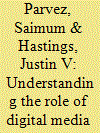

|
|
|
|
|
| Summary/Abstract |
Notwithstanding the discernable participation of women in terrorist groups, empirical research on women in terrorism is very scant in Bangladesh. To fill this gap, our article examines women’s involvement in terrorism by analyzing the life stories of dozens of Bangladeshi women terrorists. We use a terrorist lifecycle approach to understand the role of digital media in female participation, particularly in terms of when in the lifecycle digital media becomes important, and in terms of how digital media interacts with other factors to shape women’s involvement in terrorist organizations. After analyzing female profiles and their socio-demographic traits, we provide an in-depth analysis of three female terrorist lifecycles. An analysis of the profiles of Bangladeshi terrorists who use digital media reveals that women were more likely to use digital media than men in the recruitment phase. The in-depth case studies of three female terrorist profiles find that multiple and different factors impact their terrorist life cycles. Social networks – families and friends – typically play a role in individuals’ decision to become involved and further engagement in terrorism. Specifically, digital media allows women to expand their social interactions beyond what is possible in person, thus allowing for virtual pathways into terrorism.
|
|
|
|
|
|
|
|
|
|
|
|
|
|
|
|
| 16 |
ID:
099723
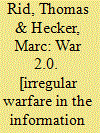

|
|
|
|
|
| Publication |
New Delhi, Pentagon Press, 2010.
|
| Description |
ix, 280p.
|
| Standard Number |
9780313364709
|
|
|
|
|
|
|
|
|
|
|
|
Copies: C:1/I:0,R:0,Q:0
Circulation
| Accession# | Call# | Current Location | Status | Policy | Location |
| 055371 | 355.0218/RID 055371 | Main | On Shelf | General | |
|
|
|
|
|
|
|
|
|